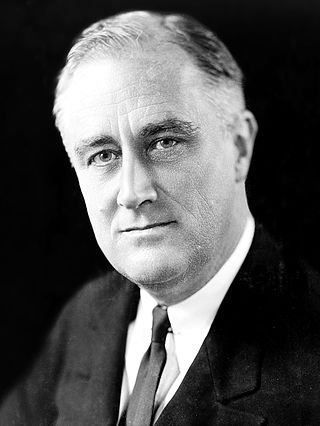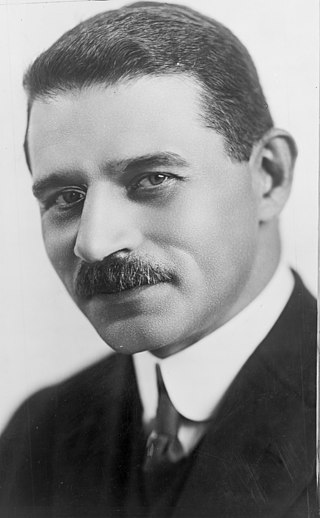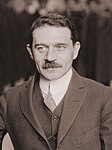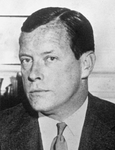
The 1932 United States presidential election was the 37th quadrennial presidential election, held on Tuesday, November 8, 1932. The election took place against the backdrop of the Great Depression. The incumbent Republican President Herbert Hoover was defeated in a landslide by Democrat Franklin D. Roosevelt, the governor of New York and the vice presidential nominee of the 1920 presidential election. Roosevelt was the first Democrat in 80 years to simultaneously win an outright majority of the electoral college and popular vote, a feat last accomplished by Franklin Pierce in 1852, as well as the first Democrat in 56 years to win a majority of the popular vote, which was last done by Samuel J. Tilden in 1876. Roosevelt was the last sitting governor to be elected president until Bill Clinton in 1992. Hoover became the first incumbent president to lose an election to another term since William Howard Taft in 1912, and the last to do so until Gerald Ford lost 44 years later. The election marked the effective end of the Fourth Party System, which had been dominated by Republicans. It was the first time since 1916 that a Democrat was elected president.

James John Walker, known colloquially as Beau James, was mayor of New York City from 1926 to 1932. A flamboyant politician, he was a liberal Democrat and part of the powerful Tammany Hall machine. He was forced to resign during a corruption scandal.

Tammany Hall, also known as the Society of St. Tammany, the Sons of St. Tammany, or the Columbian Order, was an American political organization founded in 1786 and incorporated on May 12, 1789, as the Tammany Society. It became the main local political machine of the Democratic Party and played a major role in controlling New York City and New York State politics, and helped immigrants, most notably the Irish, rise in American politics from the 1850s into the 1960s. Tammany usually controlled Democratic nominations and political patronage in Manhattan for over 100 years following the mayoral victory of Fernando Wood in 1854, and used its patronage resources to build a loyal, well-rewarded core of district and precinct leaders; after 1850, the vast majority were Irish Catholics due to mass immigration from Ireland during and after the Irish Famine of the late 1840s.

The mayor of New York City is elected in early November every four years, in the year immediately following a United States presidential election year, and takes office at the beginning of the following year. The city, which elects the mayor as its chief executive, consists of the five boroughs, which consolidated to form "Greater" New York on January 1, 1898.

Morris Hillquit was a founder and leader of the Socialist Party of America and prominent labor lawyer in New York City's Lower East Side. Together with Eugene V. Debs and Congressman Victor L. Berger, Hillquit was one of the leading public faces of American socialism during the first two decades of the 20th century.

John Patrick O'Brien was an Irish-American politician who served as the 98th Mayor of New York City from January 1 to December 31, 1933.

Joseph Vincent McKee, Sr. was a teacher at DeWitt Clinton High School in the Bronx, New York, who later became a politically active Democrat and briefly served as the acting mayor of New York City.

Franklin D. Roosevelt was elected governor of New York in 1928 and served from January 1, 1929, until shortly after his election as President of the United States in 1932. His term as governor provided him with a high-visibility position in which to prove himself as well as provide a major base from which to launch a bid for the presidency.
Sewer socialism was an originally pejorative term for the American socialist movement that centered in Milwaukee, Wisconsin, from around 1892 to 1960. The term was coined by Morris Hillquit at the 1932 Milwaukee convention of the Socialist Party of America as a commentary on the Milwaukee socialists and their perpetual boasting about the excellent public sewer system in the city.
James Joseph Hines was a Democratic Party politician and one of the most powerful leaders of Tammany Hall in New York City.

The 1906 New York state election was held on November 6, 1906, to elect the governor, the lieutenant governor, the Secretary of State, the state comptroller, the attorney general, the state treasurer and the state engineer, as well as all members of the New York State Assembly and the New York State Senate.

The 1917 New York City mayoral election replaced sitting mayor John P. Mitchel, a reform Democrat running on the Fusion Party ticket, with John F. Hylan, the regular Democrat supported by Tammany Hall and William Randolph Hearst.

Charles Horatio Matchett was an American socialist politician. He is best remembered as the first candidate of the Socialist Labor Party of America for Vice President of the United States in the election of 1892 and as the party's candidate for President of the United States in the election of 1896.

The New York City mayoral election of 1953 occurred on Tuesday, November 3, 1953, with the Democratic candidate, Manhattan Borough President Robert F. Wagner, Jr. winning a decisive plurality in a three-way race.

Elections were held to elect the New York City Board of Aldermen on November 5, 1929, in concert with other such contests as the Mayor, the Comptroller, the President of the Board of Aldermen, Borough presidents, County Sheriffs, and other miscellaneous questions.

The 1929 New York City mayoral election was held on November 5 in concert with other municipal elections. Democratic incumbent Jimmy Walker defeated Republican challenger Fiorello H. La Guardia in what was considered "a Crushing Defeat to [the] City G.O.P. [delivered]" by Tammany Hall. Socialist candidate Norman Thomas also ran, as did Socialist Labor candidate Olive M. Johnson and former Police Commissioner Richard Edward Enright for the Square Deal Party.

The New York City mayoral election of 1933 took place on November 7, 1933 in New York City. Incumbent Democratic Mayor John P. O'Brien, who was elected in a special election after the resignation of Mayor Jimmy Walker, faced Republican Congressman and 1929 mayoral candidate Fiorello La Guardia, and former acting mayor and President of the New York City Board of Aldermen Joseph V. McKee, who became acting mayor after Walker's resignation until the special election, and ran on the Recovery Party line.

The 1925 New York City mayoral election took place on November 3, 1925, resulting in a victory for Democratic Party candidate Jimmy Walker.

The 1921 New York City mayoral election took place on November 8, 1921, resulting in a victory for Democratic Party candidate John Francis Hylan.


















